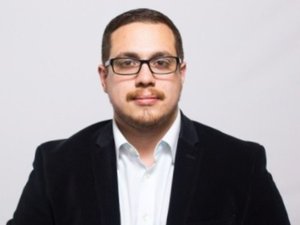Kate Rabinowitz looked at the gender disparity among speakers at Data Community DC's meetups on a whim. She was already running her blog, DataLensDC, where she's using data to tell the stories of the District, and she figured "why not?"
What she found was unexpected: In the past year, women only spoke at the local data meetups when sharing the stage with a man, on panels or in group talks. So she shared the results on Twitter on Oct. 6.
The response Rabinowitz got was also unexpected. Data Community DC has since provided a Google Form for people to submit suggestions for talks. Many on Twitter suggested that Rabinowitz be one of the speakers at Data Community DC's meetups. And this weekend's Tech Lady Hackathon will take on the project of looking at the gender breakdown among speakers at all of D.C.'s tech-related meetups as one of their projects.
"I'm not trying to call people sexist or bad or anything like that," Rabinowitz said. "There are so many reasons why this can and does happen, and it doesn't mean that it's malicious intent, but I think calling it out leads to productive conversations."
To think, Rabinowitz only started DataLensDC a year ago. Her background is in statistics — she got her Master's in it from Boston University — so she wanted to create a site that made open source data understandable through graphs and other visuals. Rabinowitz loves D.C., so naturally, she wanted to create a way to tell the stories of D.C. through its open data.
"Having lived here for six-and-a-half years, I've very much seen the changes and the things that are changing and things that are staying the same, and it's really cool to dive into the data aspects of that," she said. "So now anytime I see something around the city, I wonder if there's data about that."
Anytime she does wonder, Rabinowitz admits that it always takes way longer for her to find that data source than she might like. Not because she's too busy to search for it, but because open data, in general, isn't standardized. Data sets can come in all shapes and sizes — as Excel documents or PDFs, or as incomplete sets of data.
Now anytime I see something around the city, I wonder if there's data about that
For example, once, when she had a simple question—where are all of the pharmacies in D.C.—she had to submit a Freedom of Information Act request for the 2016 list of pharmacy locations, and then later cross-reference that list with the 2014 list when her 2016 list came back without any addresses.
"So sometimes these questions that don't seem like they're that difficult become these epic journeys," she said. "But I think it's fun to dig into this and play detective a little bit."
Rabinowitz is starting to rely less on open data and shifting towards trying to make more data open. So she's putting in a lot of FOIA requests and other public records requests to access data that isn't readily available through places like the Census Bureau or other public government agency databases.
"I've been FOIA-ing for data that I know exists, and there's no reason why it shouldn't be open and publicly available," she said. "So in a way that shifted my workflow from analysis and visualization in data to a lot more time spent on finding and preparing data because there's no specifications in FOIA as to how you have to present the data."
In the past year, because of her site, she's also engrossed herself in the D.C. open data and civic tech community. She's now a data lead for Code for DC, a local Code for America chapter, and an organizer for Tech Lady Hackathon.
It's fun to dig into this and play detective a little bit.
Which is how she came across the problem of a lack of female speakers at gender-neutral tech-related meetups. It came up through a conversation with a friend, and she looked into Data Community DC just out of curiosity.
"Certainly they're not the only one with this issue," she said. "In terms of Data Community DC, I think we have a productive conversation about how to run a meetup and ways that it can maybe be done better."
Rabinowitz hopes that this one Twitter conversation and the upcoming hackathon project will help the community to recognize the problem
"These things seem like little improvements, but it can make a little difference that one day can snowball into a bigger difference."
What's next? Rabinowitz isn't sure, but she knows she wants to tackle problems of data standardization or to help more people digging into D.C.'s open data."I know that there are so many people on their own doing data analysis, so to the extent that I can promote that and help them find their way if that's what their interested in, I would love to do that," she said.




